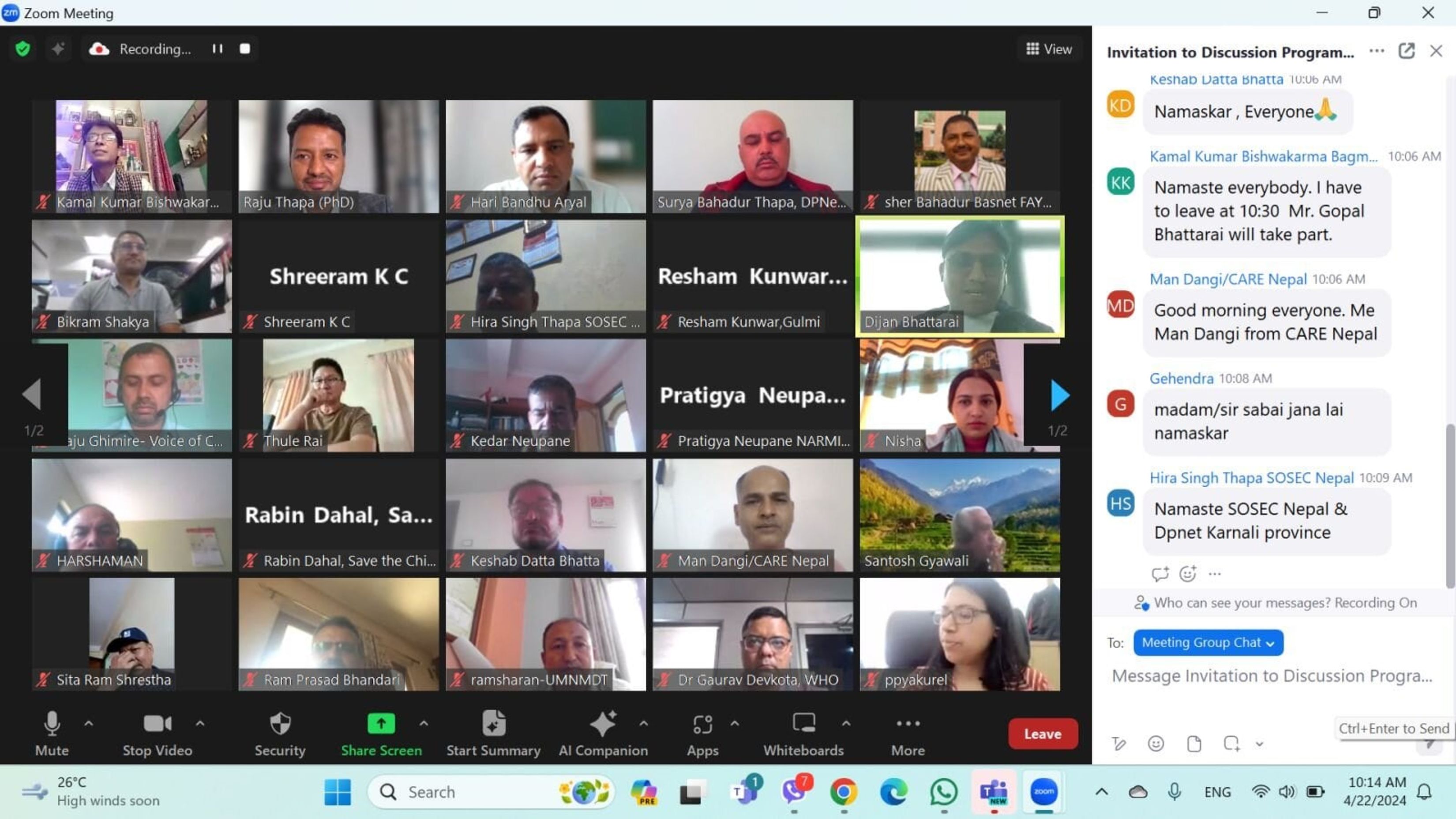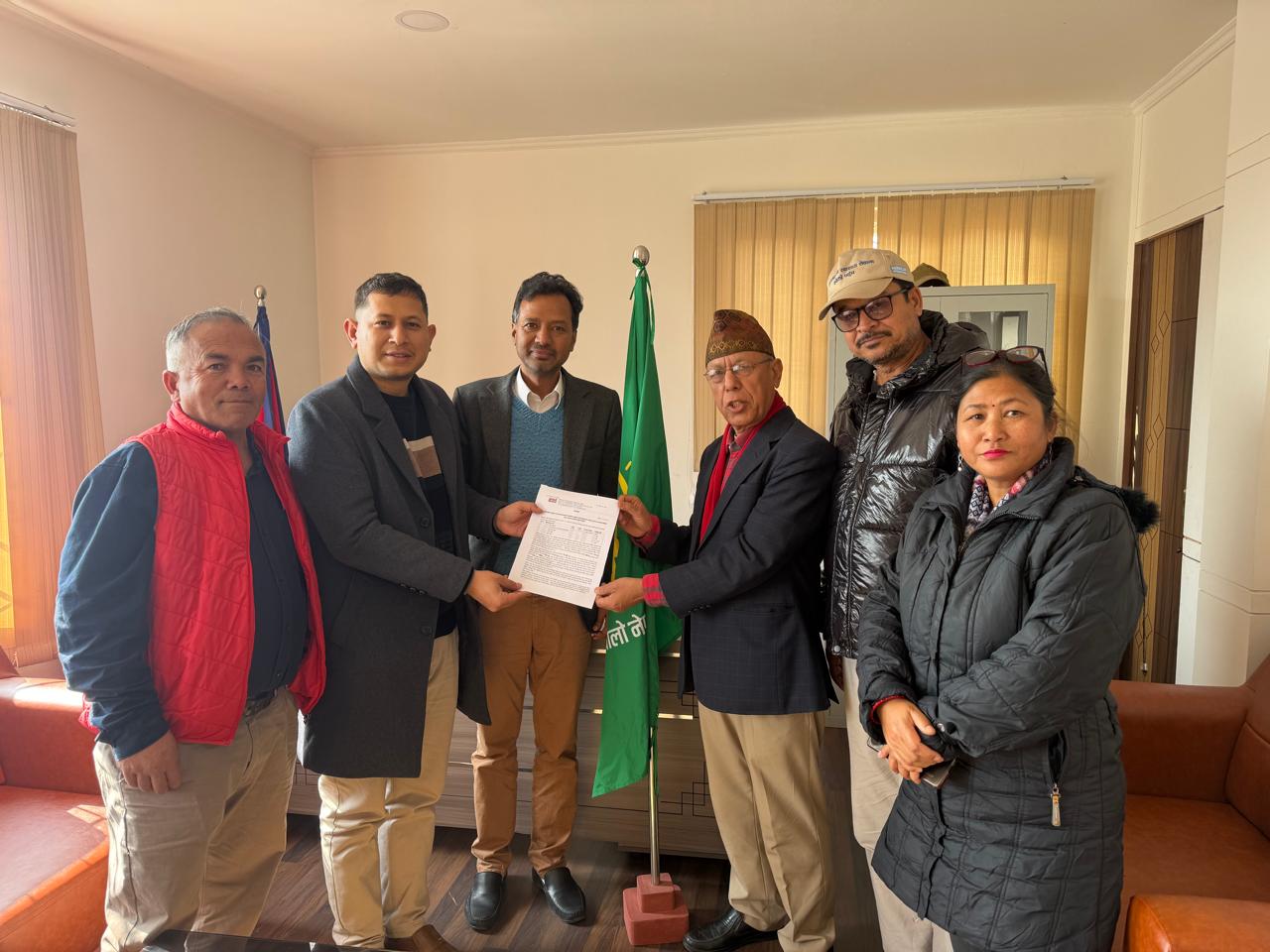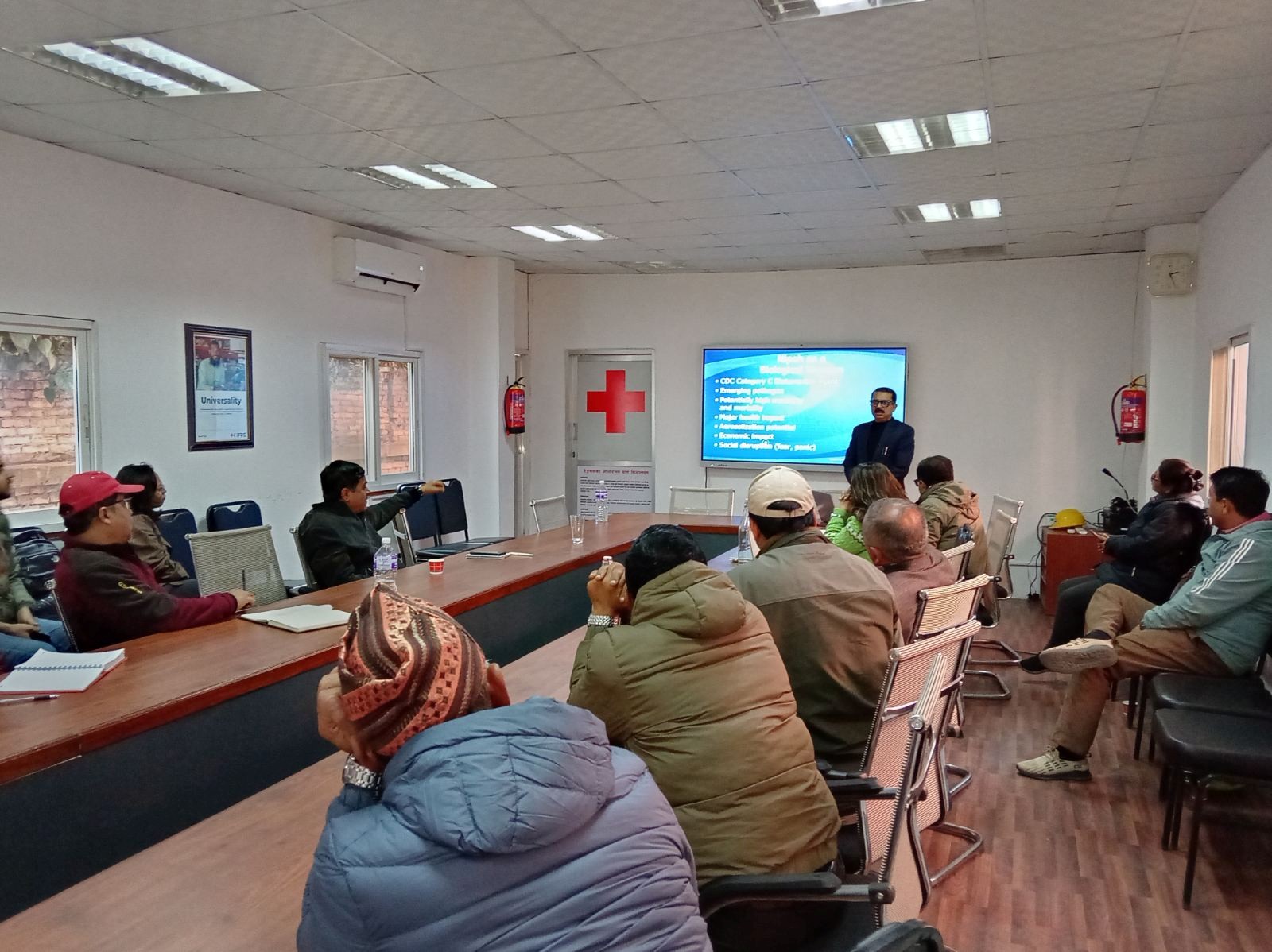Discussion Program on Recent Fire Incidents in Nepal

DPNet organized a virtual discussion program on April 22, 2024, on Recent Fire Incidents in Nepal. The event was participated by 60 plus stakeholders, including government, I/NGOs, and Media. The program was chaired by Dr. Raju Thapa, Chairperson of DPNet. Mr. Surya Bahadur Thapa, Immediate Past President of DPNet, welcomes participants who highlight the ongoing fires, stressing their detrimental effects on lives, assets, and the environment, including biodiversity loss. Mr. Thapa acknowledged that, under the leadership of NDRRMA, development agencies could effectively coordinate and collaborate moving forward. He emphasized that, based on the insights gathered from this program, a way forward could be determined.
Dr. Dijan Bhattarai, Spokesperson of NDRRMA presented on "Current Incidence of Fires in Nepal and the Way Forward." He highlighted a recent fire incident in Gulmi where 89 houses and cattle sheds were lost, along with 75 livestock. Additionally, over the past three days, according to the Bipad portal, there have been two fatalities, an estimated loss of 37 million, 150 damaged infrastructures, and 174 livestock destroyed, with ten people injured across Nepal. He noted that the data indicated the central region of Nepal, particularly Lumbini Province, has experienced a higher number of incidents. Dr. Bhattarai also shared records from the past three years, highlighting Okhaldhunga and Dolpa as the districts most affected by fire incidents. He also emphasized the prevalence of domestic fires, with Morang district reporting the highest number. From the data spanning from Baisakh 1 to 9 of the year 2081, domestic fires claimed the lives of 5 individuals, left 17 injured and resulted in a total of 208 incidents. The districts most affected by domestic fires were Rupendehi and Kapilvastu. Similarly, forest fire incidents resulted in no deaths but left 4 injured, with a total of 72 incidents, and Pyuthan being the district most affected.
Dr. Bhattarai outlined the way forward, emphasizing the necessity of collaboration between the three tiers of government, raising public awareness, and the crucial role of all stakeholders and individuals. He stressed the need for adequate equipment and training centers for firefighting purposes. Additionally, he highlighted the importance of training forest security personnel, increasing the number of volunteers, adopting relevant technologies, and implementing an incident command system.
Mr. Bhagat Singh Khadka, Chairperson, Isma Rural Municipality in Gulmi, shared an incident that occurred on Baishak 8 in wards 1, 2, and 4, due to fires, along with winds, and storms. He mentioned that in Ward 2 (Sindunkhaa, Dhegatol, Maindada) and Ward 4 (Kotkoteli, Timlekhadka, Matkina), a total of 23 houses, 46 livestock shelters, one temple, and public infrastructure were affected. To manage the fire, the Armed Police Force (APF), Municipal Police, and Nepal Police are working together. He highlighted the initiation of drinking water supply in two locations and the start of construction for temporary toilet facilities to prevent the spread of infections. Additionally, temporary tarpaulin shelters for livestock have been set up. He requested all stakeholders to assist with their respective positions.
Kamal Kumar Bishwakarma, DPNet Bagmati Province Committee Chairperson, shared data from 2080 Falgun and Chaitra as obtained from the Province Police Station and the Forest Ministry. He reported that four thousand hectars of forests in Bagmati Province had experienced forest fires, resulting in significant damage. Specifically, six cemented houses and sixteen cattle sheds were destroyed, causing an economic loss of 1,71,38,000 NPR. Tragically, two individuals lost their lives while attempting to extinguish a community-based forest fire, with seven others sustaining injuries. Additionally, eight livestock were injured, and seventy-three lost their lives in the fires. He noted that the provincial government provided financial assistance of 1 lakh NPR per affected individual, while the District Administration Office allocated 15 thousand NPR. However, bureaucratic procedures hindered the efficiency of these processes. Furthermore, while the Nepal Red Cross Society offered immediate non-food items for assistance, there was a lack of long-term support. Mr. Bishwakarma also highlighted the establishment of the Disaster Management Fund by the local government of Bagmati Province. However, he noted that the regulations governing this fund did not adequately address long-term reconstruction support, leaving a gap in the provision of assistance and support for affected communities.
Mr. Bikram Shakhya, ICIMOD, in his presentation, shared the forest fire recognition and monitoring system. This system relies on daily data obtained from two satellites. The website for accessing this data is http://nepal.spatialapps.net/NepalForestFire/. Mr. Shakhya explained how the website functions and provided the necessary information. Users can input a specific date to retrieve relevant data, and the site also offers indicators with their meanings. Additionally, users have the option to download pictures and draw data in tabulated form. He emphasized the availability of features for both visual and tabular data representation. In many instances, the forecasts generated by this system have proven to be accurate and consistent, serving as an early warning system for fire incidents. Mr. Shakya presented fire statistics from 2013 to 2024 in chart form, illustrating their trends.
Mr. Nagdev Yadav, Chairperson, DPNet Madhesh Province Committee, explained that all eight districts of the Madhesh province have the Chure range in their upper part. Madhesh has faced various disasters at different times, including the current challenge of forest fires, resulting in significant loss of biodiversity. However, discussions on minimizing forest fires have been limited. The region has experienced two to three instances of forest fires, and recently, light rainfall occurred twice, somewhat mitigating the impact of the fires. He urged the government, communities, and development organizations to collaborate in addressing these challenges together.
Mr. Hari Bandhu Aryal, Chairperson, DPNet Gandaki Province Committee, highlighted an increase in forest fire incidents. He mentioned that they had requested all members from 11 districts to update them on the situation. In Myagdi, 20-35 community forests were affected by fire. Additionally, in Kusma of Parbat district, a village with 30-40 households experienced a forest fire. The Armed Police Force (APF) and police are working to extinguish the fire. Furthermore, Kaligandaki Syangja had two affected families, while Nawalparasi East had one affected family. Mr. Aryal provides information that DPNet Gandaki member organizations have been providing information to the District Disaster Management Committee (DDMC).
Mr. Hira Singh Thapa, Chairperson, DPNet Karnali Province Committee, reported that during the fiscal year 2080/81, a total of 191 incidents occurred, resulting in 17 deaths, 12 injuries, 149 livestock fatalities, and an economic loss of 11,71,59,000. He updated that the incidence of fire has been increasing day by day.
Mr. Sher Bahadur Basnet, Chairperson, DPNet Sudur Paschim Province Committee, emphasized that Kailali and Kanchanpur are abundant in forests. He identified two main causes of forest fires: natural incidents and human-made actions lacking proper precautions, both adversely impacting nearby agriculture. He also raised concerns about short circuits at power line stations. Providing further details, he highlighted specific areas affected by fires, including Kailali, Joshipur, Gaurigunj Municipality, and Dodara Chadani, resulting in agricultural losses exceeding 50 lakhs. Additionally, he mentioned that the Chure areas have encountered fires on three occasions.
Mr. Dharm Raj Ghimire, Coordinator of the DPNet Lumbini Province Committee, provided an update on the situation, reporting approximately 40 fire incidents, mainly occurring in community forests and Kharbari. These incidents have destroyed 140 houses. The reports shows that the 165 cattle sheds are also affected. Thirteen people have been injured, and over 100 livestock have been impacted. The affected areas include Gulmi, Arghakhachi, Rupendehi, and Palpa, specifically Kusma in Gulmi, Bhumikasthan in Arghakhachi, Padini, Malarani, and Sitganga municipality, as well as Rohini and Gaidahawa municipality in Rupendehi. So far, assistance has been provided by the NRCS, wards, and local municipalities. Additionally, the heatwave has exacerbated problems in the Terai region.
Mr. Thakur Bhandari, Chairperson of FECOFUN, expressed gratitude to DPNet Nepal for organizing this important discussion program. He provided some alarming statistics, noting that Nepal has a total of 22,760 community forests covering 23 lakh hectares of forest area, with around 31 lakh households associated with them, representing nearly half of the country's population. Unfortunately, the communities living around these forests are often the most affected by forest fires, resulting in fatalities. Furthermore, national parks and conservation areas have also been impacted by fires, an issue that is often overlooked and under-discussed. Mr. Bhandari emphasized that due to hot weather conditions, tackling forest fires has become increasingly challenging. He called for sustainable solutions to address this issue and highlighted the need for better preparedness, as discussions often occur only during times of vulnerability, with insufficient action taken to prevent fires from occurring every year.
Mr. Thule Rai, Advisor, DPNet Nepal, mentioned that there are currently 147 fire brigades operating at 110 local levels. He emphasized the need for professional firefighters in the event of forest fires.
Dr. Raju Thapa, Chairperson, DPNet Nepal, in his closing remarks, expressed gratitude to all the participants and assured them of continued discussions in the future. He mentioned that program news will also be will be updated on the website. Additionally, Dr. Thapa informed all stakeholders about the Virtual Discussion Platform of DPNet Nepal and requested to provide opinion related fire risk mitigation and formally close the program.











